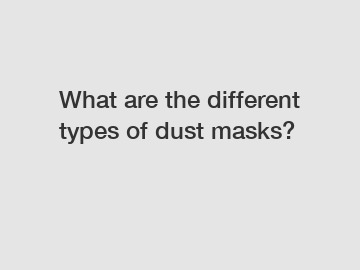What are the different types of dust masks?
What are the different types of dust masks?
With the increasing concern about air pollution and harmful airborne particles, the use of dust masks has become a common practice. These masks provide protection against various types of dust, pollutants, and allergens, ensuring the safety and well-being of individuals who work or live in dusty environments. But with so many options available in the market, it can be overwhelming to know which type of dust mask is the right one for you. So, let's dive into the different types of dust masks and their unique characteristics.
1. N95 Respirators: N95 respirators are the most commonly used and highly recommended masks for protection against harmful airborne particles. These masks are capable of filtering out 95% of small particles, including dust, pollen, and other particles as small as 0.3 microns. N95 respirators are tested and approved by the National Institute for Occupational Safety and Health (NIOSH). They fit securely around the face and provide a tight seal, minimizing the risk of inhaling hazardous particles. N95 masks are widely used in construction, mining, healthcare, and industrial settings.

2. N99 Respirators: N99 respirators offer even higher filtration efficiency compared to N95 masks. These masks filter out 99% of particulate matter, making them highly effective in protecting against fine dust particles, smoke, and certain airborne pathogens. N99 masks are extremely suitable for individuals working in environments with higher levels of pollution or if they have a compromised respiratory system. They also provide a comfortable breathing experience due to their unique valve design, which helps in reducing heat and moisture build-up inside the mask.
3. N100 Respirators: N100 respirators, also known as HEPA masks, are the most efficient type of dust masks available. These masks provide a filtration capacity of 99.97% against hazardous particles, including fine dust, mold spores, bacteria, and viruses. N100 masks are commonly used in healthcare settings, laboratories, and construction sites where protection against highly toxic particles is crucial. However, it's important to note that these masks may be more difficult to breathe through due to their high filtration capacity.
4. P95 and P100 Masks: P95 and P100 masks are oil-resistant respirators that offer excellent protection against both solid and liquid airborne particles. These masks are particularly useful in industrial settings where oil-based aerosols or liquid particles are present, such as during painting or pesticide application. The "P" in the mask classification stands for "oil-proof." P95 masks provide a minimum 95% filtration efficiency, while P100 masks provide a minimum 99.97% filtration efficiency. These masks also feature a built-in exhalation valve, making breathing easier when wearing them for extended periods.
In conclusion, the type of dust mask you choose depends on the level of protection required and the specific environment you are working or living in. N95, N99, and N100 respirators are ideal for general dust and particle protection, with increasing levels of filtration efficiency. If you are exposed to oil-based aerosols or liquid particles, P95 and P100 masks are the way to go. Regardless of the mask type, it is essential to ensure a proper fit and seal for maximum effectiveness. Remember to dispose of disposable masks appropriately and clean or replace reusable masks regularly.
By understanding the different types of dust masks, you can make an informed decision to safeguard yourself against harmful airborne particles effectively.
Contact us to discuss your requirements of ffp2 duckbill respirator, kn100 class duckbill shaped mask, kn100 mask. Our experienced sales team can help you identify the options that best suit your needs.

Comments
0